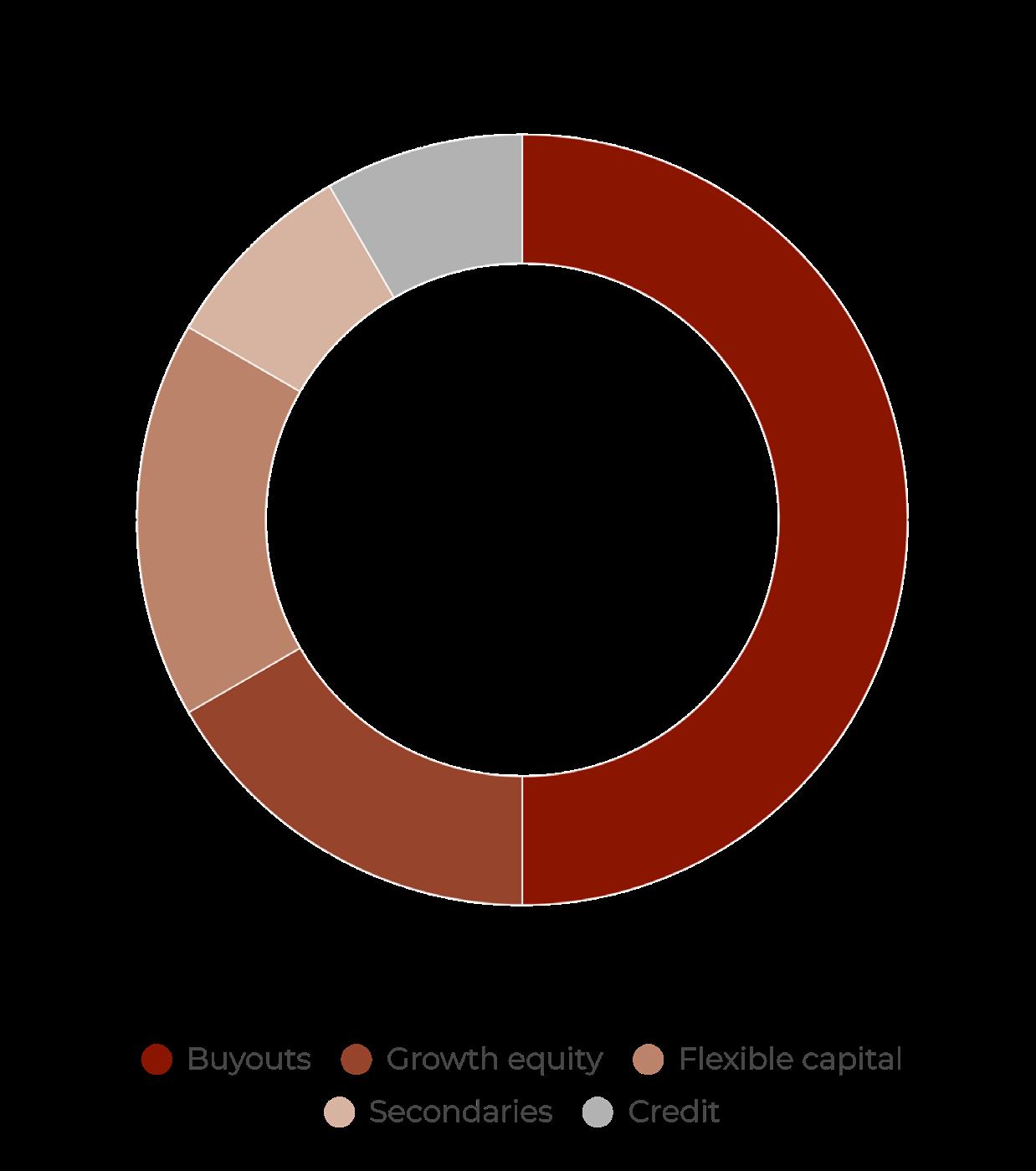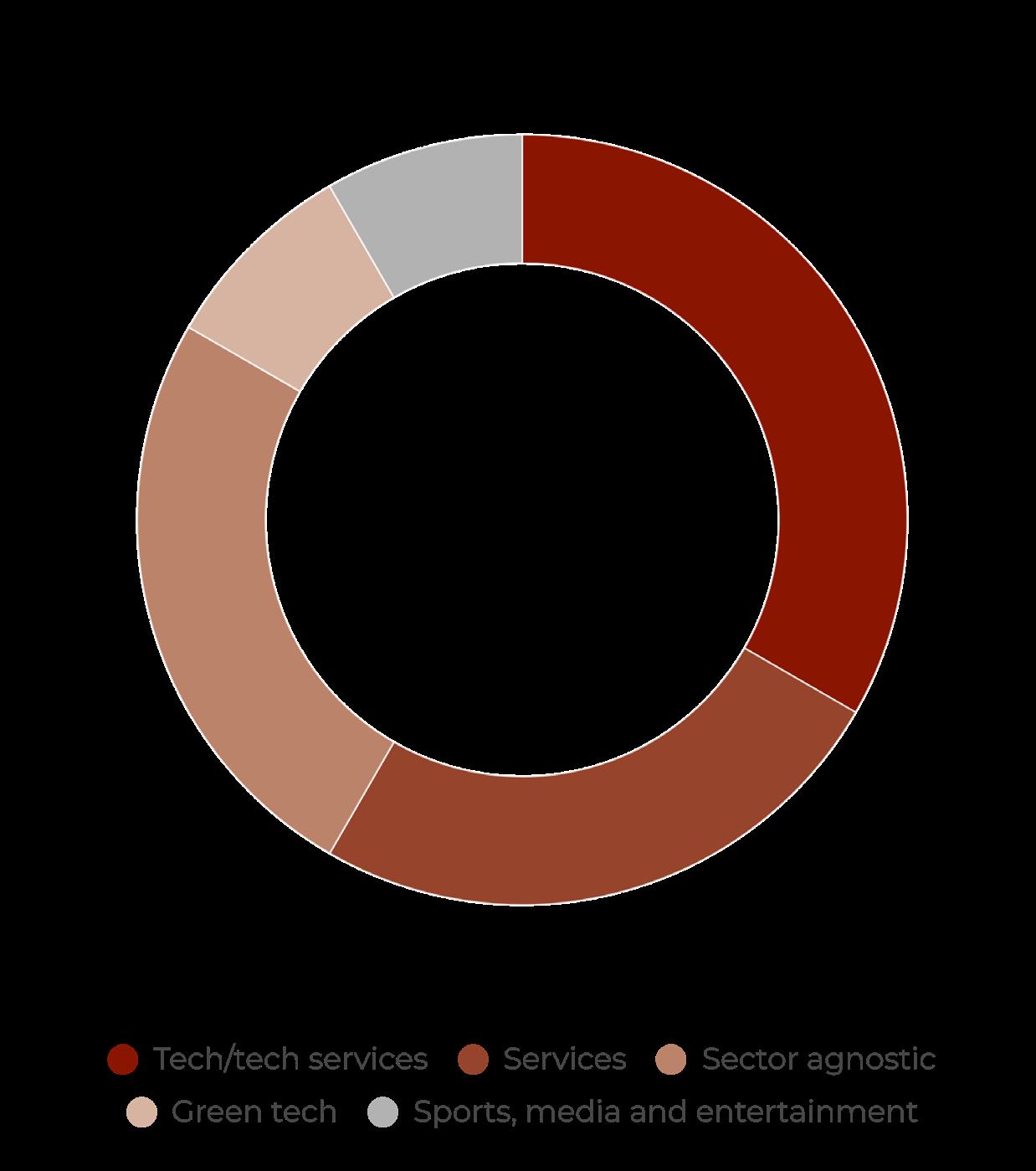SUPPORTED BY:


SEPTEMBER 2024

PRIV A TE EQUITY WIRE


SUPPORTED BY:


SEPTEMBER 2024

PRIV A TE EQUITY WIRE

SPOTLIGHT ON SPECIALISATION, DIVERSIFICATION AND VALUE CREATION
Private markets are evolving, by necessity. Macro-economic shifts since the pandemic have brought with them valuation peaks and troughs, asset logjams, liquidity challenges, and pressure to adapt to a more demanding – and concerned –investor base.
Megafunds have weathered the storm, but the critical mass of the private equity space has struggled with both fundraising and dealmaking – pushing many to raise the question of consolidation in the industry. Conversations with managers and investors – in the context of this report and otherwise – reveal that newer firms on the block that replicate conventional PE models will continue to struggle. Firms need something special.
Private Equity Wire’s ‘Ones to Watch 2024’ list highlights 12 firms that have managed to differentiate themselves, communicate their proposition, raise funds and deploy capital effectively in what has been the most challenging of periods for private markets.
It’s a fresh crop of managers – six out of the 12 were founded in 2020 or later. Only half of the firms highlighted follow the traditional buyout model – the rest have either built a flexible suite of tailored financing and liquidity solutions, or specialise in expanding asset classes such as credit or secondaries.
Sector specialisms are also in vogue – with technology and business-to-business services proving hotspots, while green tech and sports, media and entertainment are also areas of opportunity. Five out of the 12 restrict their focus to small/mid-market assets, while half have a particular regional focus.
A common thread across most firms, beyond specialisms, is a distinct focus on value-creation at the asset level through operators – signalling a shift away from traditional financial modelling. Another theme to explore is the diversification of the investor base, which brings its own challenges. Section two of this report digs deeper into these considerations.
We’d like to extend our gratitude to ZEDRA, our research partner for this report – we hope you find it engaging and insightful.
AFTAB BOSE SENIOR RESEARCH ANALYST
The list featured in this report is by no means a ranking, and should not be seen as an indication of performance. The Ones to Watch are firms that match PEW’s criteria for an ‘emerging manager’ (see below); have captured interesting niches in the market; and have demonstrated a degree of resilience to market pressures in recent months.
Our classification of an emerging manager in private markets is a firm that has raised no more than three funds, and was established within the last five-toseven years. Data on fundraising, performance, strategy and dealmaking – all of which informed the selection – was aggregated from a diversity of sources, including Pitchbook, Preqin, Bloomberg and a wide range of news sources.
This was combined with PEW’s own industry intel and resources, to compile the Ones to Watch 2024 list, and inform the analysis presented in section two on the emerging managers landscape.
A look at some of the most interesting emerging managers in the private equity landscape, picked out by Private Equity Wire’s editorial team


Specialism: Credit (small/mid-cap)
Headquarters: London
Founders: Ilkka Rantangen, Phil Fretwell, Jon Ferguson
Pedigree: Ares, Goldman Sachs, Sixth Street, Metric Capital
A thematic credit investor focused on small to mid-sized companies within software and business-to-business services. AshGrove was founded in 2019 and has closed and fully invested one fund which it completed raising in 2021, at €300m – and is currently understood to be raising and investing its second. The firm is among the only European thematic credit managers specifically focused on these business models whilst also targeting smaller companies, working with private & growth equity funds as well as directly with founders.
Specialism: Green tech (growth equity)
Headquarters: Copenhagen
Founders: Laurits Back Sørensen, Rasmus Lund, Troels Øberg
Pedigree: HP, Aastra Telecom, Ørsted
NAP recently closed its second flagship fund, raising €266m for green tech growth investments across the Nordics and DACH. The new SFDR Article 9 fund targets majority stakes in companies operating in disruptive industries where technology adoption is a key hurdle. More than two thirds of the partner group focus solely on operational and capital efficient value creation – enabling what the firm describes as “hypertransformation” in the green tech growth stage. Recent transactions include exits to listed strategic buyers such as Tesla and EdenRed.
Specialism: Services (mid-market)
Headquarters: Chicago
Founder: Ryan Anthony, Nicholas Christopher
Pedigree: LaSalle Capital, Houlihan Lokey, Goldman Sachs
Founded in 2020, Longshore has raised funds – one closed – amounting to a total of more than $450m, in what have been four markedly challenging years for PE fundraising, particularly for new managers on the block. The firm, which is an RIA, is specialized in revenuecycle services – spanning the tech-enabled, managed and human capital segments. Longshore-backed Blue Wheel was recently in the news for acquiring Day One Digital – an ecommerce strategist for Amazon vendors.
Specialism: Structured capital solutions
Headquarters: London
Founder: Walid Fakhry, Stephen Edwards Pedigree: Core Capital, PwC
Founders Stephen Edwards and Walid Fakhry have been working together since 2004, when they founded Core Capital to focus on growth businesses. The pair launched Soho Square in 2021, and have already closed three buyout funds – two of which are fully invested. The firm favours healthy, resilient businesses – with an emphasis on quality management teams that are invested themselves in the business, incentivising growth and a focus on upside.
Scope for growth - ‘5/12 have a focus on small/mid-market assets’












Mapping opportunities - ‘6/12 have a regional focus for their investments’














Freshly founded - ‘6/12 were founded in 2020 or later’










Specialism: Industrials and services (mid-market)
Headquarters: Connecticut
Founder: Aaron Wolfe, Jordan Wadsworth
Pedigree: Sun Capital
Having both worked together for a number of years at Sun Capital, Aaron Wolfe and Jordan Wadsworth founded Point41 in 2022, with a focus on value creation along the metrics of ‘team, integrity, expertise and execution’. Point41 has raised $300m for its debut funds per regulatory filings, and targets investments in the North American mid-market, with enterprise values between $50-300m according to Pitchbook.
Headquarters: California
Specialism: Tech-enabled (growth equity)
Founder: Robert Little, Edward Woiteshek
Pedigree: Golden Gate Capital, Hellman & Friedman
Founded in 2021, Valeas has two open buyout funds that have raised a total of more than $475m, and operates several managed co-investment vehicles –focused on tech-enabled growth companies across the healthcare, financial services, consumer, data and technology sectors. The firm is an RIA, and was most recently in the news for partnering with Hellman & Friedman to make a strategic investment in CPA advisory firm Baker Tilly.
Headquarters: California
Specialism: Secondaries
Founder: James Gamett
Pedigree: StepStone Group
Founder James Gammett was formerly a Partner and Head of Secondaries at StepStone Group, after which he co-founded healthcare services company Madison Creek Partners, before founding Sweetwater in 2016. The boutique PE firm specialises in asset-focused secondary transactions – geared towards solving the liquidity challenges incumbent to the PE industry today. It announced a capital raise of $505m early in 2024.
Headquarters: London
Specialism: Flexible capital solutions (mid-market)
Founder: Cristobal Cuart, Marc Ciancimino
Pedigree: KKR Credit, Apollo
Founded in 2019, All Seas Capital looks to invest in Western European mid-market businesses with an EBITDA range of €5-75m, with typical investment sizes ranging from €25m to €100m. The sector-agnostic firm specialises in flexible solutions that are designed to meet the specific needs of entrepreneurs, founders, families and investment funds. The firm was recently in the news for an investment in Dutch education platform Reducate EdTech Group. Sector


Headquarters: Riyadh
Specialism: Digital transformation (MENA)
Founder: Othman Alhokail, Abdullah Al Tamami and Abdulrahman Bin Mutrib
Pedigree: Enhance Ventures, Seera Group, Knowledge Connect Group
Licensed by the Capital Market Authority of Saudi Arabia and founded in 2018, the firm manages private funds across venture capital, private equity, debt financing and other asset classes – with a distinct focus on backing technology as a growth driver in Saudi, and more widely the MENA region. The firm was most recently in the news for an $82.8m investment in SHIFT – a provider of smart, tech-enabled mobility solutions and logistics.
Headquarters: Munich
Specialism: Services (DACH)
Founders: Florian Kopp, Jens Cremer and Daniel Beringer
Pedigree: Robur Group, Starwood Capital, Westbrook Partners
Greenpeak was founded in 2020, and specialises in the business services, healthcare and real asset services sectors across the DACH region – with a specific focus on generating a positive ecological and social impact with stakeholders. The firm’s investment criteria include a strong management team, profitable turnover between €5-50m, and alignment with four ‘megatrends’: innovation; green and sustainable business models; digitisation; and longevity and health.
Headquarters: New York
Specialism: Sports, media and entertainment
Founders: Brent Stehlik, Isaac Halyard, Niraj Shah
Pedigree: RedBird Capital, OneTeam Partners
An operator-founded private investment firm, Otro targets under-monetised and often under-valued assets in the sports, media, gaming and entertainment industries. The three founders were all involved in Otro’s €200m investment in Renault’s Alpine F1, while Isaac Halyard sits on the board of footballing giant AC Milan. The firm is very new, founded in 2023, and currently has two open funds across its buyout and coinvestment strategies.
Headquarters: Melbourne
Specialism: Technology (mid-market)
Founders: Robin Bishop, Simon Harle, Ben Gray
Pedigree: Macquarie, TPG
BGH was founded in 2017, with two of its founding members – Simon Harle and Ben Gray – having previously worked together at TPG, leading more than AUD 2bn of equity investments. BGH is focused on mid-market tech companies across Australia and New Zealand, and has raised more than $4.5bn across two buyout funds. In April, the firm was reported to be preparing the sale of ForHealth for an estimated valuation of $1bn.
Hearing from our ‘Ones to Watch’ on how firms can best differentiate themselves in today’s PE landscape.
The differentiation strategies of what we class as emerging managers markedly reflect shifting industry dynamics. Among them: a stronger focus on asset quality and value creation; innovative financing solutions that solve ongoing liquidity challenges; and/or a clearly defined specialisation – either by asset size, asset class, or in line with high-opportunity sectoral dynamics.
Underpinning all of these is the drive towards a more operationally optimised PE shop (see boxout), while a trend to watch is the diversification of fundraising channels.
Soho Square Capital is positioned to provide a mix of credit and equity solutions – focused on cash-rich, fundamentally strong businesses.
The firm’s Founder and Co-Managing Partner, Walid Fakhry, says the PE market is evolving.
“If you look at performance data over the past few years, the strongest positive correlation is with fund vintage – signalling a clear reliance on cyclical value.

“Large-cap funds offer sufficient returns with that model, and investors will continue to favour them until given a compelling reason to rotate. A clear value creation thesis that withstands market volatility is one such reason.”
Through a combination of deal structuring; board-level strategic experience on issues of finance, function, systems and processes; and clearly defined sourcing strategies for founders and business owners, Fakhry says Soho Square has been delivering outsized returns.
“Our risk profile is unique. Highly leveraged transactions are typically beta plays these days – it’s too efficient of a market to generate real alpha, barring perhaps the distressed space. In the middle market, our innovative deal structuring puts us among the few managers generating alpha.”
Responsible, among other things, for Soho Square’s operations, Fakhry highlights the building blocks that enable a modern PE firm. “Basic tools such as a CRM are critical, and most emerging managers should be outsourcing the majority of their back office functions such as admin and compliance. Still, significant resource will be required to oversee third-party partnerships, particularly where a firm’s service offering is complex and differentiated.”
As for technology, he acknowledges its value from a resource efficiency standpoint when it comes to automating workflows and documentation during due diligence and research. “But it’s not necessarily a source
of competitive advantage in PE, unless the model entails holding thousands of investment positions.”
Further emphasising the focus on asset quality and operational value creation is Nordic Alpha Partners. The firm’s Co-Founder and Senior Partner, Laurits Bach Sørensen, highlights that two thirds of the partners and ressources are fully dedicated to value creation, enabling the GP to work with assets up to one year ahead of acquisition and being very close to the fast paced scaling and expansion throughout the ownership period. It also allows the GP to lead the exit process via an in house M&A model.
“We establish multiple value peaks for our assets, build attainable hypotheses, mature the management teams and and prepare several exit strategies prior to investing.”
The firm’s structure reflects its priorities: with clear delineation between the investment teams and the value creation teams across the entire transaction lifecycle, and equal emphasis on both functions at the leadership level.
Still, the biggest differentiator for NAP is its sector specialism, uniquely positioned in the growth equity space for green tech. Sørensen says: “The green transition represents a $250tn investment opportunity if we want to hit net zero by 2050 – per Bloomberg estimates. The net zero goal is currently impossible with the demographic and economic trends
“
Large-cap funds offer sufficient returns with that [conventional] model, and investors will continue to favour them until given a compelling reason to rotate.
Walid Fakhry Founder and Co-Managing Partner, Soho Square Capital
being as they are - but green technology is a tremendous catalyst for change”.
“But there’s a substantial gap in the market. Green tech investment is currently either focused on early stage companies in the VC space, or late stage infrastructure projects. Growth equity, a crucial conduit, is staggeringly underserved.”
The reason for this is apparent, says Sørensen. The types of companies needed to drive the green transition are still in their infancy, which means the sector requires what he describes as “hyper transformation” in the growth phase. “This entails significant capex outlays to fuel exponential revenue multiplication, rapid headcount expansion, market transformation and – all within the space of 30-40 months.
“Then there are external pressures – green tech disrupts numerous global supply and value chains which bring significant inertia.”
NAP is designed to manage hypertransformation not just via a host of external capex financing experts that advise the GP’s value creation team and its “SWAT team” of strategic C-suite leaders who can be deployed to plug gaps at the asset level, but also using internal resources across legal and compliance, finance and AI-based transaction analysis and forecasting.
Much of the firm’s success in fundraising, and eyewatering exit multiples, can be ascribed to its focus on value creation in what is a highopportunity sector.
AshGrove operates in what is easily the most illustrious private markets segment of late – the booming credit industry. The asset class’s astronomical growth has brought with it a crowded and competitive market, where differentiation has become all the more important.
The firm’s Co-Founder and Partner, Jon Ferguson, says: “Differentiation varies within each credit segment. So, for example, in direct lending a means of differentiation might be types of counterparties you work with, financing size, whether you provide senior or junior secured investments or geographic focus, while in asset-based lending it might be the types of collateral that are considered by managers.
“For AshGrove, the differentiating factor is a deliberate focus on the smaller end of the financing market, typically lending €10-50m on a sole senior secured basis to businesses that fall under the radar of traditional direct lenders.”
He notes a dwindling credit supply and appetite in this space, driven by the regulatory capital constraints on banks and the growing size of traditional direct lending funds. Still, the number of potential borrowers is large across Europe, representing a significant opportunity set – frequently with more diverse uses of credit capital – beyond M&A activity or refinancing – than wider credit markets.
(continued on p13)

Deputy Head of Funds, Channel Islands at ZEDRA
Two significant arenas of differentiation in the emerging managers space – value creation and diversification of the investor base – both have operationally heavy elements, says Mark Cleary, Deputy Head of Funds, Channel Islands at ZEDRA.
The capacity and willingness to be integrally involved at the asset level – from longer due diligence cycles, to hands-on management and detailed value creation strategies – has become a selling point for new PE firms on the block. This is in addition to the internal operational demands of a PE firm, which call for emerging managers to be streamlined, agile machines.
“There is a long list of considerations,” says Cleary. “The jurisdiction of a fund, that of its investors, and all the administrative, governance and compliance requirements that follow; the management of engagements, documents, transaction
details and accounts – all executed within tight timeframes and recorded in core fund systems where they can be accessed with speed and reliability.
“Every penny counts for an emerging manager, so it’s crucial these back-office functions are streamlined and efficient. Deal teams should be fully focused on finding and developing the right assets and building relationships.”
Beyond differentiation in their investment approach, firms are also addressing the fundraising squeeze by diversifying their LP base – by region and type, with a particular focus on the private wealth and, potentially, retail channels.
Cleary says: “Much of the talk around retailisation currently relates to the wealthier band of individual investor– those with $1-5bn available to invest. This base will have a degree of investor sophistication,
but even here there are several factors to consider.
“Firstly, firms will need a distribution network to service a broad church of investors, which most emerging managers won’t necessarily have. Secondly, private funds tend to have a cap on the number of investors: In Jersey and Guernsey, for instance, there is a limit of 50 investors in each fund – in which case the preference would be to target wealthier investors.
“There is also the administrative burden associated with admitting many smaller investors. Taking this one step further: the idea of tokenisation is being explored to make the private markets more democratic, and allow retail investors to access the potentially outsized returns that larger institutions have been enjoying for years.”
Whichever direction the market takes, diversification of the LP base will bring
with it a complex web of governance and administration, as will a continued focus on value creation.
“Where possible, emerging firms should be outsourcing their operational burden, but the choice of partner is crucial. It’s important to have a low level of friction in working culture – a partner should be consultative and understand the specific needs of your organisation. But they should also have the integrity to push back on an idea if there are risks involved,” says Cleary.
He notes an important balance to strike when it comes to the size of partner organisations. “If it’s too big, there’s a risk of dilution when it comes to service. At the same time, with all the diversification demands laid out above, it’s important to work with an organisation that has the inherent capacity, experience and scalability to help adapt to ever-evolving market trends.”
There is a sector focus too – specifically software and business-to-business services, which Ferguson says “exhibit common characteristics that are credit enhancing and offer resilient, defensive growth characteristics for investors.” With this thematic approach, the firm has carved its niche in the smaller segment of Europe’s lending market, working with PE, growth equity and – notably – directly with founders.
A robust operational setup is a key priority. “Loans are by their nature operationally more intensive than equity or other asset classes, so actively managing a diversified credit book across geographies, end markets, currencies and maturities requires investment in infrastructure and processes, as well as seamless collaboration across investment,
legal, finance and operations teams.
“The importance of culture across these areas is often overlooked, yet it reinforces the correct behaviours across the entire business and ensures all members of the team have a mindset of ‘owning the risk’.”
Operating in a less competitive segment of the market whilst only being focussed on high quality business models, combined with an optimised infrastructure and the right culture, are the secret to delivering compelling riskadjusted returns to investors.
The democratisation, or retailisation, of private markets is now a much-discussed topic. Currently focused on the high-net-worth
segment of private investors, the concept is being touted by some as the future of private markets – particularly as larger institutional capital continues to flow to established megafunds.
There are still plenty of unanswered questions here, says Fakhry. “It’s certainly a trend with momentum: private banks are already leveraging advanced technology to aggressively deliver PE instruments to individuals.
“But there are several complexities to iron out: private clients have less fiduciary responsibilities than their institutional counterparts, and therefore less inclination to lock up capital; they also have less sophisticated due diligence and risk
management, leaving managers exposed –further intensified by the significantly higher number of investors.”
As a whole, Fakhry notes private markets are starting to resemble public markets of recent decades – with highly condensed due diligence timelines and, at the upper end of the market, heavy investment in technology to fully streamline the transaction lifecycle. For new managers on the market, these are some future directions to consider.

CONTRIBUTORS:
Aftab Bose
Head of Private Markets Content aftab.bose@globalfundmedia.com
Johnathan Glenn Head of Design johnathan.glenn@globalfundmedia.com
Please contact sales@globalfundmedia.com